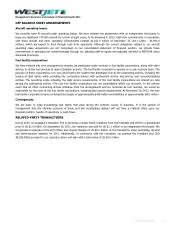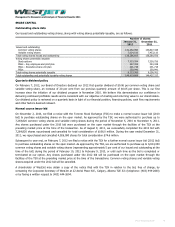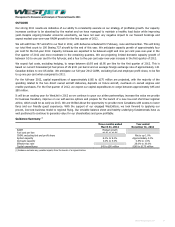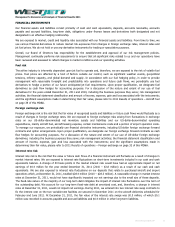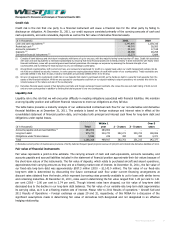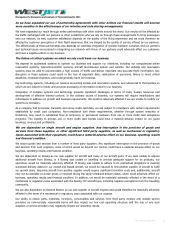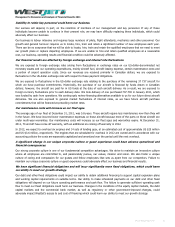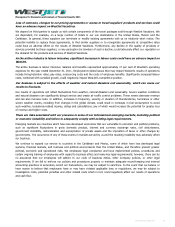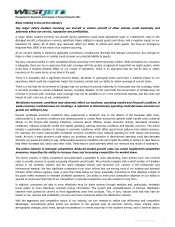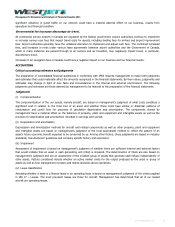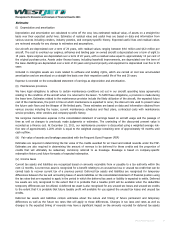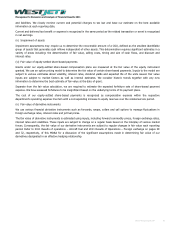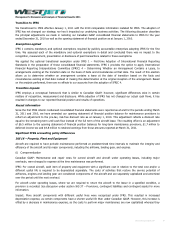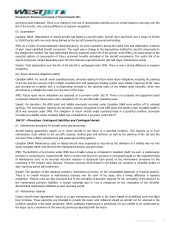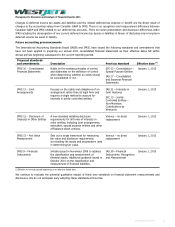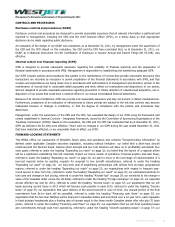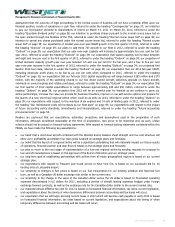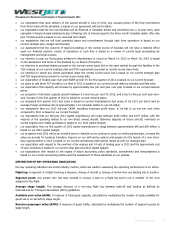Westjet 2011 Annual Report Download - page 47
Download and view the complete annual report
Please find page 47 of the 2011 Westjet annual report below. You can navigate through the pages in the report by either clicking on the pages listed below, or by using the keyword search tool below to find specific information within the annual report.
Management’s Discussion and Analysis of Financial Results 2011
│
such as foreign exchange rates and international political events. A significant portion of an airline's costs, such as labour,
aircraft ownership and facilities charges, cannot be easily adjusted in the short term to respond to market changes.
Government intervention, regulations, rulings or decisions rendered that impose additional requirements and
restrictions on operations could increase operating costs or disrupt our operations.
The airline industry is subject to extensive laws relating to, among other things, airline safety and security, provision of
services, competition, environment and labour concerns. Government entities such as Transport Canada, the Competition
Bureau, the Canadian Transportation Agency, and other domestic or foreign government entities may implement new laws or
regulatory schemes, or render decisions, rulings or changes in policy that could have a material adverse impact on the airline
industry in general by significantly increasing the cost of airline operations, imposing additional requirements on operations or
reducing the demand for air travel.
Laws relating to data collection on guests and employees for security purposes and counterbalancing privacy legislation have
increased costs of operations. Any material changes that add additional requirements to collecting, processing and filing data
with, or otherwise reporting data to, government agencies may materially impact our business.
The increase in security measures and clearance times required for guest travel could have a material adverse effect on guest
demand and the number of guests we carry. A reduction in guest numbers could have a negative impact on our revenues and
results of operations.
Many aspects of airlines’ operations are subject to increasingly stringent environmental regulations, and growing concerns
about climate change may result in the imposition of additional regulation particularly with respect to greenhouse gas
emissions. Numerous jurisdictions around the world have implemented or announced measures to penalize for greenhouse
gas emissions as a means to deal with climate change. Certain of these measures cover the airline industry or may do so in
the future. The impact to us and our industry from such actions is likely to be adverse and could be significant, particularly if
regulators were to conclude that emissions from commercial aircraft cause significant harm to the upper atmosphere or have
a greater impact on climate change than other industries. We may be directly exposed to such measures, which could result in
additional costs that could adversely affect our margins and results of operations. We may not be able to recover the cost of
compliance with new or more stringent environmental laws and regulations from our passengers, which could adversely affect
our business.
Terrorist attacks or military involvement in unstable regions may harm the airline industry.
After the terrorist attacks of September 11, 2001, the airline industry experienced a substantial decline in guest traffic and
revenue, and increased security and insurance costs. In late 2009, certain incidents again heightened the concern regarding
terrorist attacks. Any future incidents causing a heightened concern over potential terrorist attacks could cause a further
decrease in guest traffic and yields, and an increase in security measures and related costs for the airline industry generally.
Additional terrorist attacks would likely have a further significant negative impact on our business and the airline industry.
Should such an attack occur in Canada, the adverse impact could be very significant.
Our operations are affected by a number of external factors that are beyond our control such as weather conditions and
special circumstances or events occurring in the locations we serve.
Delays or cancellations due to weather conditions and work stoppages or strikes by airport workers, baggage handlers, air
traffic controllers and other workers not employed by us could have a material adverse impact on our financial condition and
operating results. Delays contribute to increased costs and decreased aircraft utilization, which negatively affect profitability.
Our business is dependent on its ability to operate without interruption at a number of key airports, including Toronto Pearson
International Airport and Calgary International Airport. An interruption or stoppage in service at a key airport could have a
material adverse impact on our business, results from operations and financial condition.
A localized epidemic or a global pandemic may adversely affect our business.
A widespread outbreak of widespread illness (whether domestic or international) or any governmental or World Health
Organization travel advisories (whether relating to Canadian or international cities or regions) could affect our ability to
continue full operations and could materially adversely affect demand for air travel. We cannot predict the likelihood of such a
public health emergency or the effect that it may have on our business or the market price of our securities. However, any
WestJet Annual Report 2011 47


